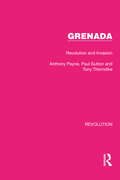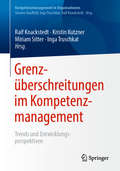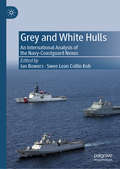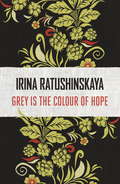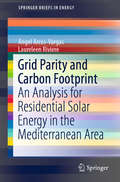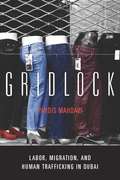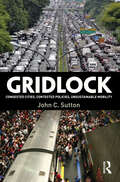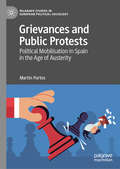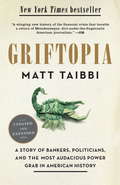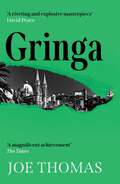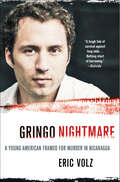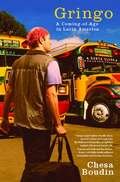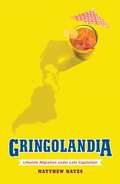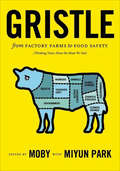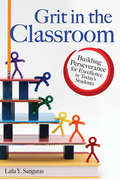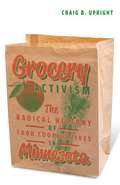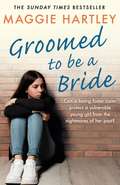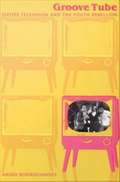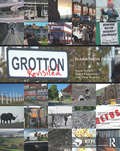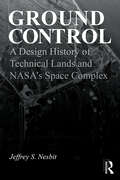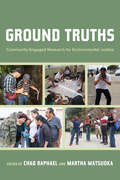- Table View
- List View
Grenada: Revolution and Invasion (Routledge Library Editions: Revolution #13)
by Anthony Payne Paul Sutton Tony ThorndikeThis book, first published in 1984, analyses the background to the revolution in Grenada and details the course of its progress, examining the reasons why it faltered and failed. International factors played no small part in these events, setting the agenda for the internal processes of the revolution and bringing it to an end. The book also examines closely the US-led invasion of this tiny island and its aftermath.
Grenzmanagement im Wandel: Transnationale Bedrohungen und Sicherheitspolitik der europäischen Staaten
by Johann WagnerDieses Buch befasst sich mit den Prozessen des Wandels und der Erneuerung der Grenzkontrollen und der Grenzsicherung und -verwaltung in den letzten 30 Jahren nach dem Fall des Eisernen Vorhangs sowie mit den immensen Herausforderungen bei der Nationenbildung in Südosteuropa nach dem Zusammenbruch des ehemaligen Jugoslawien in Bezug auf das strategische Sicherheitsmanagement. Die Abschaffung der Grenzkontrollen im Schengen-Raum und die gleichzeitige Einführung notwendiger Ersatzmaßnahmen war ein weiteres Thema.Das Buch gibt einen Einblick in die Kompetenzen der Europäischen Union bei der Reform und Modernisierung der staatlichen Strafverfolgungsbehörden zur Gewährleistung einer effektiven Grenzkontrolle, Grenzüberwachung und Grenzverwaltung im Einklang mit dem EU-Besitzstand und den EU-Standards.Im 21. Jahrhundert schafft ein sich ständig weiterentwickelndes Sicherheitsumfeld zusammen mit dem Prozess der Globalisierung neue Dimensionen von Bedrohungen und Herausforderungen für die Sicherheit und Stabilität transnationaler Natur. Dies erfordert umfassende, multidimensionale, kollektive und gut koordinierte Antworten.Die Europäische Union, die Organisation für Sicherheit und Zusammenarbeit in Europa (OSZE), die Vereinten Nationen sowie andere internationale Organisationen sind in der Lage, einen echten Beitrag zur Entwicklung kooperativer und koordinierter Antworten auf diese Bedrohungen zu leisten, indem sie sich auf ihre breite Mitgliedschaft und ihr profundes Fachwissen und ihre Erfahrung stützen.Nach Auffassung der Europäischen Union sollte ein modernes, kosten- und nutzenorientiertes und effektives Grenzschutzsystem sowohl offene Grenzen als auch ein Höchstmaß an Sicherheit gewährleisten. Daher ist die Union bestrebt, die innere Sicherheit aller Mitgliedstaaten durch die Verhinderung grenzüberschreitender Bedrohungen, die Bekämpfung der irregulären Migration und jeglicher Form der grenzüberschreitenden Kriminalität zu gewährleisten, um einen reibungslosen Grenzübertritt für legitime Reisende und deren Hab und Gut, Waren und Dienstleistungen sicherzustellen.Aus diesem Grund wurde das Unionskonzept des integrierten Grenzschutzes entwickelt, um eine wirksame Grenzkontrolle und -überwachung sowie eine kosteneffiziente Verwaltung der Außengrenzen der Europäischen Union zu gewährleisten.Die Politik der Union wird auch in Zukunft auf der Grundlage der drei wichtigsten Bereiche entwickelt: gemeinsame Rechtsvorschriften, enge operative/taktische Zusammenarbeit und finanzielle Solidarität. Darüber hinaus wurde die integrierte Grenzverwaltung als vorrangiger Bereich für die Stärkung der Zusammenarbeit mit Drittländern im Rahmen des strategischen Sicherheitsmanagementkonzepts der Europäischen Kommission bestätigt, in dem Nicht-EU-Länder als Partner ermutigt werden, ihre Grenzsicherheits-, Überwachungs- und Grenzverwaltungssysteme zu verbessern.
Grenzüberschreitungen im Kompetenzmanagement: Trends und Entwicklungsperspektiven (Kompetenzmanagement in Organisationen)
by Inga Truschkat Ralf Knackstedt Kristin Kutzner Miriam SitterDas Fachbuch zeigt Innovationspotenziale im Kompetenzmanagement auf. Diese Potenziale unterstützen Organisationen beispielsweise bei der Gewinnung und Bindung von Fachkräften, bei der Realisierung komplexer Leistungsangebote und bei der Erhöhung von Effizienz und Effektivität betrieblicher Abläufe. Sie erhalten konkrete Hinweise und anregende Perspektiven zur Innovation des Kompetenzmanagements und Ihnen werden Chancen und Risiken von Grenzüberschreitungen aufgezeigt. Als Leitmotiv dient dabei die Zusammenführung von bisher traditionell unzureichend verbundenen und oft isoliert betrachteten Aspekten des Kompetenzmanagements.
Grey and White Hulls: An International Analysis of the Navy-Coastguard Nexus
by Ian Bowers Swee Lean Collin KohThis book undertakes an in-depth examination of the diversity in international approaches to the navy-coastguard nexus. It considers the evolving global maritime security landscape and the emergence and proliferation of maritime law enforcement agencies—collectively referred to here as “coastguards”—performing peacetime constabulary duties alongside navies. Through a cross-regional study of various countries worldwide, including those in Asia and Europe, this book reveals that there is no one optimal, “one size fits all” organizational structure. Instead, there is a wide array of drivers that influence a nation-state’s maritime security architecture and its organizational approach to managing security at sea, or broadly speaking, securing its national maritime interests.
Grey is the Colour of Hope
by Irina RatushinskayaIf it ever falls to you, my reader (though God forbid!) to see your name written on a prison wall and followed by the letters 'LYMTL', that will simply mean 'Love You More Than Life'. These letters are no harder to remember than 'KGB'. GREY IS THE COLOUR OF HOPE is the searing account of the author's experiences in a brutal Soviet labour camp. Only twenty-eight when she was imprisoned for her poetry, Irina Ratushinskaya was already regarded as a leading writer of her generation, in the line of Mandelstam and Pushkin. She nearly died from maltreatment and a series of hunger strikes before eventually finding freedom. With surprising moments of humour, her inspiring memoir reveals how a group of incarcerated women built for themselves a life of selfless courage, order and mutual support.
Grid Parity and Carbon Footprint: An Analysis For Residential Solar Energy In The Mediterranean Area (SpringerBriefs in Energy)
by Ángel Arcos-Vargas Laureleen RiviereThis book analyses the economic and environmental aspects of installing photovoltaic facilities for residential electricity users and determines whether the installation of photovoltaic units “behind the meter” makes sense, and if so, the best economic size to install. It explores the use of photovoltaic capacity to meet electricity requirements by generating enough for immediate use without feeding surplus electricity into the grid and without using storage. The authors illustrate this approach by examining various power photovoltaic capacities in locations such as Marseille, Madrid and Seville, which use hourly demand data provided by smart meters. They also show the possibility of developing energy self-consumption compatible with the operation of the network, making use of information from smart meters. Discussing how photovoltaic facilities are profitable from both an economic and an environmental point of view, this book is a valuable resource for researchers and private investors. It is also of interest to practitioners and academics, as the results presented are of importance for the near future.
Grid/ Street/ Place: Essential Elements of Sustainable Urban Districts
by Nathan CherryToday's urban resident is seeking a more flexible, sustainable environment-representing a unique, diverse, vibrant, and responsible way of living-as an alternative to the typical development patterns of suburban and semi-urban sprawl. Can urban design help create this type of sustainable urbanism? Grid Street Place presents a unique approach to understanding urban design through scientific, empirical research. The authors examined more than 100 successful projects throughout North America to identify differences and commonalities, and they discovered universal elements that characterize sustainable urban districts. By applying these essential elements, designers and developers can recreate and extend the experience of successful places to their communities. Myriad plans, sections, diagrams, and charts illustrate how each district work-at an extremely detailed level. Concrete examples, as opposed to generalities, make Grid Street Place a must-read for anyone interested in the working strategies of urban design.
Gridlock
by Pardis MahdaviMahdavi (anthropology, Pomona College) qualitatively explores how Euro-American discourses and policies (forged primarily in Washington D. C. ) about human trafficking and migration affect the lived experiences of migration, forced labor, and trafficking in the United Arab Emirates, arguing that many of the policies ostensibly designed to reduce abuse and rights violations have had precisely the opposite effect. Instead of approaching trafficking as a criminal matter, she suggests, one needs to see it as a matter of migration and labor gone awry and thus as a human rights matter. Annotation ©2011 Book News, Inc. , Portland, OR (booknews. com)
Gridlock: Congested Cities, Contested Policies, Unsustainable Mobility
by John C. SuttonCities across the world are facing unprecedented challenges in traffic management and transit congestion while coping with growing populations and mobility aspirations; existing policies that aim to tackle congestion and create more sustainable transport futures offer only weak remedies. In Gridlock: Congested Cities, Contested Policies, Unsustainable Mobility, transport consultant John C. Sutton explores how two competing discourses in transport policy and planning practice – convivial and competitive ideologies – lead to contradictory solutions and a gridlock in policy as well as on transport systems. Gridlock examines current transport and mobility in a geographical, social, political-economy and technological context. The challenges of rising congestion are highlighted through case studies from the UK, the USA, and OECD countries. Sutton offers readers a vision of a sustainable mobility future through the concept of mobility management, combining mobile communication and information technology with logistics to match travel demand to the capacity of transport systems. Essential reading for transport professionals and students of transportation planning and policy, Gridlock offers a unique manifesto for sustainable mobility settlement, addressing the pressing problems of growing populations and congestion while looking ahead to a more sustainable future.
Grievances and Public Protests: Political Mobilisation in Spain in the Age of Austerity (Palgrave Studies in European Political Sociology)
by Martín PortosThis book sheds light on the role that grievances play for mobilisation dynamics in a context of material deprivation. Why do people protest? To what extent do grievances account for the varying size of protest events over time? Covering different levels of analysis, the author argues that effects of socioeconomic aspects (both objective-material deprivation and subjective-attitudinal grievances) are mediated by political attitudes, especially political dissatisfaction. He develops a framework to account for the dynamics, trajectory and timing of the cycle of contention that unfolded in Spain in the shadow of the Great Recession, contributing not only to the field of social movement studies but to our broader understanding of European politics, political sociology, political economy and economic sociology.
Griftopia: Bubble Machines, Vampire Squids, and the Long Con That Is Breaking America
by Matt TaibbiA brilliantly illuminating and darkly comic tale of the ongoing financial and political crisis in America The financial crisis that exploded in 2008 isn't past but prologue. The grifter class--made up of the largest players in the financial industry and the politicians who do their bidding--has been growing in power, and the crisis was only one terrifying manifestation of how they've hijacked America's political and economic life.Matt Taibbi has combined deep sources, trailblazing reportage, and provocative analysis to create the most lucid, emotionally galvanizing account yet written of this ongoing American crisis. He offers fresh reporting on the backroom deals of the bailout; tells the story of Goldman Sachs, the "vampire squid wrapped around the face of humanity"; and uncovers the hidden commodities bubble that transferred billions of dollars to Wall Street while creating food shortages around the world.This is essential reading for anyone who wants to understand the labyrinthine inner workings of this country, and the profound consequences for us all.
Gringa (São Paulo Quartet #2)
by Joe Thomas'As vibrant, colourful and complex as South America's largest city'São Paulo, 2013: a city at an extraordinary moment in its history. Mario Leme, a detective in the civil police, has developed a friendship with a young English investigative journalist, Ellie. When she goes to meet a contact in central São Paulo, Mario observes from the street as she walks into a building and doesn't come out. Inside, he discovers the dead body of a young man he doesn't recognise, and Ellie's phone lying on the floor. Told partly from Leme's point of view, partly from Ellie's, Gringa takes us through five days during the redevelopment of the centre of Sao Paulo in the run-up to the 2014 World Cup. Ellie's disappearance links characters at every level of the social hierarchy, from the drug dealers and civil and military police to the political class she witnesses the feral brutality of urban breakdown. Gringa, with shades of Don Winslow and James Ellroy, is a portrait of São Paulo in all its harshness and dysfunction, its corruption and social divisions, its kaleidoscopic dynamism, its undercurrent of derangement, and its febrile, sensual instability, executed with a deep knowledge of the city's aPRAISE FOR JOE THOMAS 'Brilliant' The Times 'Feverish energy' Guardian 'Wonderfully vivid' Mail on Sunday'Sophisticated, dizzying' GQ'Vivid and visceral' The Times'Superbly realised vivid and atmospheric' Guardian'Original' Mail on Sunday'A stylish, atmospheric treat an inspired blend of David Peace and early Pinter' Irish Times 'Sparse, energetic, fragmented prose' The Spectator 'Vibrant, colourful, and complex' Irish Independent 'Stylish, sharp-witted, taut. A must for modern noir fans' NB Magazine 'Definitive confident and energetic' Crime Time 'Brilliant manic energy' Jake Arnott 'Wildly stylish and hugely entertaining' Lucy Caldwell 'Vivid, stylish, funny' Mick Herron 'Gripping, fast-paced, darkly atmospheric' Susanna Jones 'Snappy, thoughtful, moving' John King 'Exciting, fresh, incredibly assured' Stav Sherez 'Happy days!' Mark Timlin 'Utterly brilliant' Cathi Unsworth 'Had James Ellroy and David Peace collaborated on a novel they'd have written something like this' Paul Willets
Gringa (São Paulo Quartet #2)
by Joe Thomas'As vibrant, colourful and complex as South America's largest city'São Paulo, 2013: a city at an extraordinary moment in its history. Mario Leme, a detective in the civil police, has developed a friendship with a young English investigative journalist, Ellie. When she goes to meet a contact in central São Paulo, Mario observes from the street as she walks into a building and doesn't come out. Inside, he discovers the dead body of a young man he doesn't recognise, and Ellie's phone lying on the floor. Told partly from Leme's point of view, partly from Ellie's, Gringa takes us through five days during the redevelopment of the centre of Sao Paulo in the run-up to the 2014 World Cup. Ellie's disappearance links characters at every level of the social hierarchy, from the drug dealers and civil and military police to the political class she witnesses the feral brutality of urban breakdown. Gringa, with shades of Don Winslow and James Ellroy, is a portrait of São Paulo in all its harshness and dysfunction, its corruption and social divisions, its kaleidoscopic dynamism, its undercurrent of derangement, and its febrile, sensual instability, executed with a deep knowledge of the city's aPRAISE FOR JOE THOMAS 'Brilliant' The Times 'Feverish energy' Guardian 'Wonderfully vivid' Mail on Sunday'Sophisticated, dizzying' GQ'Vivid and visceral' The Times'Superbly realised vivid and atmospheric' Guardian'Original' Mail on Sunday'A stylish, atmospheric treat an inspired blend of David Peace and early Pinter' Irish Times 'Sparse, energetic, fragmented prose' The Spectator 'Vibrant, colourful, and complex' Irish Independent 'Stylish, sharp-witted, taut. A must for modern noir fans' NB Magazine 'Definitive confident and energetic' Crime Time 'Brilliant manic energy' Jake Arnott 'Wildly stylish and hugely entertaining' Lucy Caldwell 'Vivid, stylish, funny' Mick Herron 'Gripping, fast-paced, darkly atmospheric' Susanna Jones 'Snappy, thoughtful, moving' John King 'Exciting, fresh, incredibly assured' Stav Sherez 'Happy days!' Mark Timlin 'Utterly brilliant' Cathi Unsworth 'Had James Ellroy and David Peace collaborated on a novel they'd have written something like this' Paul Willets
Gringo Nightmare: A Young American Framed for Murder in Nicaragua
by Eric VolzIn the spirit of Midnight Express and Not Without My Daughter comes the harrowing true story of an American held in a Nicaraguan prison for a murder he didn't commit.Eric Volz was in his late twenties in 2005 when he moved from California to Nicaragua. He and a friend cofounded a bilingual magazine, El Puente, and it proved more successful than they ever expected. Then Volz met Doris Jiménez, an incomparable beauty from a small Nicaraguan beach town, and they began a passionate and meaningful relationship. Though the relationship ended amicably less than a year later and Volz moved his business to the capital city of Managua, a close bond between the two endured.Nothing prepared him for the phone call he received on November 21, 2006, when he learned that Doris had been found dead---murdered---in her seaside clothing boutique. He rushed from Managua to be with her friends and family, and before he knew it, he found himself accused of her murder, arrested, and imprisoned. Decried in the press and vilified by his onetime friends, Volz suffered horrific conditions, illness, deadly inmates, an angry lynch mob, sadistic guards, and the merciless treatment of government officials. It was only through his dogged persistence, the tireless support of his friends and family, and the assistance of a former intelligence operative that Eric was released, in December 2007, after more than a year in prison.A story that made national and international headlines, this is the first and only book to tell Eric's absorbing, moving account in his own words.Visit the companion Exhibit Hall at the Gringo Nightmare website for additional photos, audio clips, video, case files, and more.
Gringo: A Coming of Age in Latin America
by Chesa BoudinGringo charts two journeys, both of which began a decade ago. The first is the sweeping transformation of Latin American politics that started with Hugo Chavez's inauguration as president of Venezuela in 1999. In that same year, an eighteen-year-old Chesa Boudin leaves his middle-class Chicago life -- which is punctuated by prison visits to his parents, who were incarcerated when he was fourteen months old for their role in a politically motivated bank truck robbery -- and arrives in Guatemala. He finds a world where disparities of wealth are even more pronounced and where social change is not confined to classroom or dinner-table conversations, but instead takes place in the streets.
Gringolandia: Lifestyle Migration under Late Capitalism (Globalization and Community)
by Matthew HayesA telling look at today&’s &“reverse&” migration of white, middle-class expats from north to south, through the lens of one South American city Even as the &“migration crisis&” from the Global South to the Global North rages on, another, lower-key and yet important migration has been gathering pace in recent years—that of mostly white, middle-class people moving in the opposite direction. Gringolandia is that rare book to consider this phenomenon in all its complexity.Matthew Hayes focuses on North Americans relocating to Cuenca, Ecuador, the country&’s third-largest city and a UNESCO World Heritage Site. Many began relocating there after the 2008 economic crisis. Most are self-professed &“economic refugees&” who sought offshore retirement, affordable medical care, and/or a lower–cost location. Others, however, sought adventure marked by relocation to an unfamiliar cultural environment and to experience personal growth through travel, illustrative of contemporary cultures of aging. These life projects are often motivated by a desire to escape economic and political conditions in North America. Regardless of their individual motivations, Hayes argues, such North–South migrants remain embedded in unequal and unfair global social relations. He explores the repercussions on the host country—from rising prices for land and rent to the reproduction of colonial patterns of domination and subordination. In Ecuador, heritage preservation and tourism development reflect the interests and culture of European-descendent landowning elites, who have most to benefit from the new North–South migration. In the process, they participate in transnational gentrification that marginalizes popular traditions and nonwhite mestizo and indigenous informal workers. The contrast between the migration experiences of North Americans in Ecuador and those of Ecuadorians or others from such regions of the Global South in North America and Europe demonstrates that, in fact, what we face is not so much a global &“migration crisis&” but a crisis of global social justice.
Gristle: From Factory Farms to Food Safety
by Miyun ParkThe musician and activist offers &“a collection of compelling, well-researched essays . . . shining light on the world of agribusiness&” and Big Meat (Publishers Weekly). For everyone from omnivores to vegans, this eye-opening guide offers food for thought on today&’s meat industry. Moby, renowned musician and passionate vegan, and Miyun Park, leading food policy activist, bring together experts from diverse backgrounds including: farming, workers&’ rights activism, professional athletics, science, environmental sustainability, food business, and animal welfare advocacy. Together, they eloquently lay out how industrial animal agriculture unnecessarily harms workers, communities, the environment, our health, our wallets, and animals. In the tradition of Michael Pollan&’s The Omnivore&’s Dilemma, Gristle combines hard-hitting facts with a light touch and includes informative charts and illustrations depicting the stark realities of America&’s industrial food system. Contributors include: Brendan BrazierLauren BushChristine Chavez and Julie Chavez RodriguezMichael Greger, MDSara Kubersky and Tom O&’HaganFrances Moore Lappé and Anna LappéJohn MackeyDanielle Nierenberg and Meredith NilesWayne PacellePaul and Phyllis Willis
Grit in the Classroom: Building Perseverance for Excellence in Today's Students
by Laila SangurasThe combination of sustained hard work and resiliency, grit is the difference between those who give up and those who don't. Grit in the Classroom: Building Perseverance for Excellence in Today's Students assists educators in creating a learning environment that fosters grit development for all students, regardless of ability. Each chapter includes stories to illustrate the research and ideas presented and ends with discussion questions that can be used to continue the conversation. In an era of talent development and the pursuit of excellence, learners must be equipped with the perseverance that is essential to reaching high levels of success. This book provides a rationale for teaching grit in the classroom with the goal of propelling this topic into discussions of building passion and talent in today's students.
Grocery Activism: The Radical History of Food Cooperatives in Minnesota
by Craig B. UprightA key period in the history of food cooperatives that continues to influence how we purchase organic food today Our notions of food co-ops generally don&’t include images of baseball bat–wielding activists in the aisles. But in May 1975, this was the scene as a Marxist group known as the Co-op Organization took over the People&’s Warehouse, a distribution center for more than a dozen small cooperative grocery stores in the Minneapolis area. The activist group&’s goal: to curtail the sale of organic food. The People&’s Warehouse quickly became one of the principal fronts in the political and social battle that Craig Upright explores in Grocery Activism. The story of the fraught relationship of new-wave cooperative grocery stores to the organic food industry, this book is an instructive case study in the history of activists intervening in capitalist markets to promote social change.Focusing on Minnesota, a state with both a long history of cooperative enterprise and the largest number of surviving independent cooperative stores, Grocery Activism looks back to the 1970s, when the mission of these organizations shifted from political activism to the promotion of natural and organic foods. Why, Upright asks, did two movements—promoting cooperative enterprise and sustainable agriculture—come together at this juncture? He analyzes the nexus of social movements and economic sociology, examining how new-wave cooperatives have pursued social change by imbuing products they sell with social values. Rather than trying to explain the success or failure of any individual cooperative, his work shows how members of this fraternity of organizations supported one another in their mutual quest to maintain fiscal solvency, promote better food-purchasing habits, support sustainable agricultural practices, and extol the virtues of cooperative organizing. A foundational chapter in the history of organic food, Grocery Activism clarifies the critical importance of this period in transforming the politics and economics of the grocery store in America.
Groomed to be a Bride
by Maggie HartleyA heartbreaking, powerful true story from Britain's most-loved foster carer, perfect for fans of Cathy Glass and Casey Watson.When a terrified young girl is discovered hiding in the back of a lorry, she is quickly taken into the care of social services. Arriving on the doorstep of foster carer Maggie Hartley, she is painfully thin, bruised and unable to speak a word of English. What atrocities has she escaped to bring her here? Woken each night by the screams of Halima's nightmares, Maggie is desperate to reach this damaged young girl. But without a shared language, she fears that she may never uncover the truth behind her terror.Can Maggie help Halima recover from the horrors she has endured, and help her build a new life for herself? Or will Halima forever be haunted by the ghosts of her past?
Groomed to be a Bride (A Maggie Hartley Foster Carer Story)
by Maggie HartleyA heartbreaking, powerful true story from Britain's most-loved foster carer, perfect for fans of Cathy Glass and Casey Watson.When a terrified young girl is discovered hiding in the back of a lorry, she is quickly taken into the care of social services. Arriving on the doorstep of foster carer Maggie Hartley, she is painfully thin, bruised and unable to speak a word of English. What atrocities has she escaped to bring her here? Woken each night by the screams of Halima's nightmares, Maggie is desperate to reach this damaged young girl. But without a shared language, she fears that she may never uncover the truth behind her terror.Can Maggie help Halima recover from the horrors she has endured, and help her build a new life for herself? Or will Halima forever be haunted by the ghosts of her past?
Groove Tube: Sixties Television and the Youth Rebellion
by Aniko BodroghkozyCritics often claim that prime-time television seemed immune--or even willfully blind--to the landmark upheavals rocking American society during the 1960s. Groove Tube is Aniko Bodroghkozy's rebuttal of this claim. Filled with entertaining and enlightening discussions of popular shows of the time--such as The Monkees, The Smothers Brothers Comedy Hour, The Mod Squad--this book challenges the assumption that TV programming failed to consider or engage with the decade's youth-lead societal changes. Bodroghkozy argues that, in order to woo an increasingly lucrative baby boomer audience, television had to appeal to the social and political values of a generation of young people who were enmeshed in the hippie counterculture, the antiwar movement, campus protests, urban guerilla action--in general, a culture of rebellion. She takes a close look at the compromises and negotiations that were involved in determining TV content, as well as the ideological difficulties producers and networks faced in attempting to appeal to a youthful cohort so disaffected from dominant institutions. While programs that featured narratives about hippies, draft resisters, or revolutionaries are examined under this lens, Groove Tube doesn't stop there: it also examines how the nation's rebellious youth responded to these representations. Bodroghkozy explains how, as members of the first "TV generation," some made sense of their societal disaffection in part through their childhood experience with this powerful new medium. Groove Tube will interest sociologists, American historians, students and scholars of television and media studies, and others who want to know more about the 1960s.
Grotton Revisited: Planning in Crisis? (RTPI Library Series)
by Steve Ankers David Kaiserman Chris ShepleySome thirty years ago the small Metropolitan County of Grotton found itself bathed in the bright glare of publicity as The Grotton Papers lifted the lid on the inner workings of the six planning departments of this hitherto little remarked corner of England. The intervening years have seen Grotton's County Council aim at the admirable and mostly achievable target of becoming "average with moderate prospects of remaining average" in the Government rankings, and the struggles of the District Councils to come to terms with planning in the late twentieth – let alone twenty-first – century are once again under the spotlight. The original authors of The Grotton Papers have come together once more to offer an experienced and surprisingly unjaundiced look at the way the British planning system works. Their comprehensive survey allows real lessons to be learnt from what Grotton has – and just as importantly hasn't – done since they were last in town. Grotton Revisited is without doubt the finest (and indeed the only) satirical book on this vitally important subject. It is suitable for planners of all ages and abilities, and will be essential reading for anyone who has ever had contact with the planning system, or thinks they may know someone who has. First class entertainment and education for professionals and general readers alike. Published in association with the RTPI.
Ground Control: A Design History of Technical Lands and NASA’s Space Complex
by Jeffrey S. NesbitGround Control: A Design History of Technical Lands and NASA’s Space Complex explores the infrastructural history of the United States rocket launch complex. Working primarily between 1950, the year of the first rocket launch at Cape Canaveral, to 1969, the Apollo moon landing, the book highlights the evolution of its overlooked architecture and infrastructural landscape in parallel to US aerospace history. The cases outlined in this book survey the varying architectural histories and aesthetic motivations that helped produce America’s public image of early space exploration. The built environment of the U.S. space complex shows how its expanded infrastructural landscape tended to align with national Cold War politics and themes found in the age of modernity. Examples across often inaccessible sites of remote landscape help explain the contingent histories and deep association of an American aesthetic, land-use, and ultimately a form of nation-building practices. Ground Control offers a new way of understanding how technological uses of place-based science were designed and constructed in support of both industrial and military activities in postwar America. This book will be of interest to researchers, scholars, students, and anyone with a general interest in the history of American infrastructure, land use, and space exploration.
Ground Truths: Community-Engaged Research for Environmental Justice
by Chad Raphael and Martha MatsuokaA free ebook version of this title is available through Luminos, University of California Press’s Open Access publishing program. Visit www.luminosoa.org to learn more. This is the first book devoted entirely to summarizing the body of community-engaged research on environmental justice, how we can conduct more of it, and how we can do it better. It shows how community-engaged research makes unique contributions to environmental justice for Black, Indigenous, people of color, and low-income communities by centering local knowledge, building truth from the ground up, producing actionable data that can influence decisions, and transforming researchers’ relationships to communities for equity and mutual benefit. The book offers a critical synthesis of relevant research in many fields, outlines the main steps in conducting community-engaged research, evaluates the major research methods used, suggests new directions, and addresses overcoming institutional barriers to scholarship in academia. The coauthors employ an original framework that shows how community-engaged research and environmental justice align, which links research on the many topics treated in the chapters—from public health, urban planning, and conservation to law and policy, community economic development, and food justice and sovereignty.
